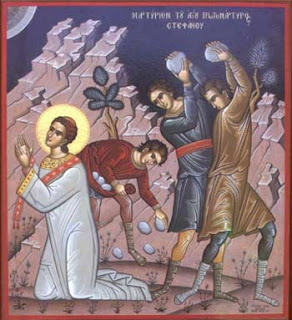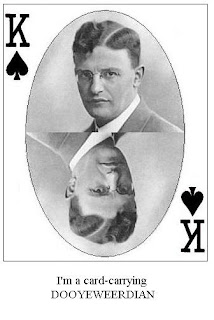Dressing appropriately
Although I can probably be said to have a somewhat distinctive sartorial style, I have written very little about clothing and fashion on this blog, except for the occasional light-hearted reference to the bow tie and to a certain
vest reviled by my beloved wife and
daughter. It's not as though I have no views on the subject; it's just that it doesn't interest me nearly as much as other things do. Once I'm dressed in the morning, I pretty much forget about it and attend to more important things.
That said, I thought I would call attention to an essay recently published in
Comment that came out in the latest print issue:
Making the most of college: The importance of dressing well, by
Jeff Cavanaugh. Here's an excerpt:
The baby boomer generation who set the style examples and the corporate dress codes today came of age in the social upheaval of the 1960s, when students everywhere were shedding the styles of their parents—along with their social and moral outlook—for sandals, tie-dye, and free love. Since then, nonconformity has become the established pattern, and everyone tries to set himself apart from all the rest. It's difficult to be rebelling constantly, though, and one is faced with terrible dilemmas: Which, among the dozens on display at the casual clothing store chain of choice, will be the t-shirt with the just-right, witty slogan to display the proper insouciance and show my friends I'm a nonconformist, too—just like them?
There was a time, however, when colleges were the centre of the men's clothing industry. Haberdashers—that's an old word for someone who sells shirts and ties and such to men—spent big money trying to attract the business of college men. Partly this was because campus fashions were at the leading edge of the style world, and partly it was because they knew if they could get a man's custom when he was young, they'd probably have it for life. A certain "Ivy League" look that started at Princeton and Yale became the dominant look for men all over North America in the years after World War II.
I myself am part of the baby boom generation that rebelled against all the old symbols of "conformity" by donning the ubiquitous and homogenizing blue jeans, something I never really took to. When I began university as an undergraduate back in 1973, I deliberately shunned this mode of dress, not quite understanding why my peers preferred to look like adolescents rather than the adults we had so recently legally become. However, instead of adopting a more classic style, I indulged in some of the more bizarre fashions of the '70s, including platform shoes, colourful plaid bell bottoms, and even a paisley faux-velvet blazer! (I shudder to imagine my daughter's response to that.)
This quickly ended after my first year, when I began to take a more serious attitude towards my studies and became newly aware of the importance of issues of war and peace, justice and injustice, and the social and political implications of my christian faith. This still didn't put me into jeans, but I did abandon my youthful foppishness — much, I am sure, to everyone's relief.
I am old enough to confirm Cavanaugh's observation that earlier generations tended to dress better than we do. I can recall seeing old home movies of my parents from around the time I was born, my father wearing a jacket and tie, and my mother a skirt — to a picnic, of all places! People would dress up to travel by train or plane, or simply to go grocery shopping. (My understanding is that Argentines still tend to dress well for such ordinary activities.) From a certain aesthetic standpoint I could wish people still did this. Blue jeans and t-shirts are, quite frankly, dull and uninteresting, calling to mind the
drab clothing once ubiquitous in maoist China. Surely we can do better than that? Here is Cavanaugh again:
[D]ressing well shows respect for others. I'm not a teacher, but I've talked to a number of professors who find it frustrating that their students, as a rule, come to class looking like they've just rolled out of bed and would really rather be there still. No professor likes it when students seem not to care, and you can communicate "not caring" by wearing a shirt that hasn't been washed in weeks as well as you can by staring out the window during the lecture.
The look that is common to college students and others today—cargo shorts, t-shirts, jeans, even pajamas—is mainly one that emphasizes comfort and individualism. Walking around in a hoodie and pajamas communicates, "I don't care what anybody else thinks about how I look; I'll wear whatever I want and whatever I'm comfortable in." Dressing up a bit, on the other hand, tells those around you that you care about the image you present to them, that you don't want to give offense, and that you take things seriously, including your studies.
As a professor who has taught for just over two decades, I can confirm much of what Cavanaugh writes above. No, I've never had anyone come to class in pyjamas, but I have had to teach some students who, from their appearance, seemed not to respect themselves, much less their peers or me.
Would I put men back into jackets and ties? Well, on some occasions, yes, but certainly not all. I would place the emphasis, not so much on dressing
well (read:
up), but on dressing
appropriately. I generally do wear a jacket and tie in the classroom, but I would never expect my students to do this — the old Ivy League style notwithstanding. I would not dress this way for a picnic, which obviously calls for sturdier clothing that one is willing to have subjected to dirt or stain.
As for the bow tie, I see it as, not only a fashion statement, but a whimsical symbol of the teaching office, communicating at once the weighty character of that office and the unwillingness of its current occupant to take himself too seriously. Yet I don't wear it all the time, especially on days when I'm not teaching.
Though I may disagree with him on specifics, I'm with Cavanaugh on this central issue: dress does matter.















